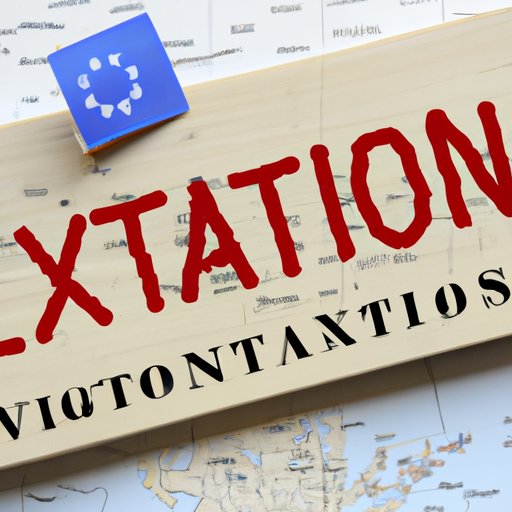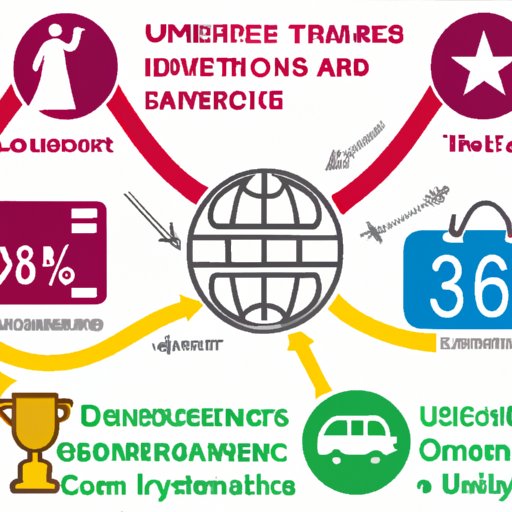Introduction
The United States has long been a leader in global travel and tourism. In 2020, however, the COVID-19 pandemic changed the landscape of international travel, with the US instituting a number of restrictions to limit the spread of the virus. This article will explore the impact of US travel restrictions, examine their current status, and look ahead to consider a timeline for the end of these restrictions.

Exploring the Impact of US Travel Restrictions on the Economy
The economic impacts of US travel restrictions have been significant. According to the US Travel Association, travel-related spending declined by $530 billion between February and October 2020, resulting in a loss of 4.6 million jobs and $155 billion in lost wages. These losses are expected to continue well into 2021, with the US Travel Association estimating that the industry will not return to pre-pandemic levels until at least 2023.
In addition to the direct economic impacts, US travel restrictions have had ripple effects throughout the economy. For example, a study conducted by the University of California, Los Angeles found that hospitality workers who were laid off due to the restrictions faced higher rates of food insecurity and housing instability than similar workers who remained employed. These findings suggest that the effects of US travel restrictions have been far-reaching and have had a disproportionate impact on vulnerable populations.
Examining the Current Status of US Travel Restrictions
At the start of the pandemic, the US imposed a number of restrictions on international travelers, including a ban on travel from certain countries and mandatory quarantines for travelers entering the country. As the pandemic has progressed, the US has begun to relax some of these restrictions. However, many remain in place, including a ban on nonessential travel from Europe, the UK, and Brazil, as well as a requirement that all air travelers provide proof of a negative COVID-19 test prior to boarding a flight.
The rationale behind these restrictions is to limit the spread of the virus and protect public health. The Centers for Disease Control and Prevention (CDC) has issued guidance recommending that individuals avoid all nonessential travel during the pandemic, and the US government has implemented a number of restrictions to ensure that travelers adhere to this guidance.

Analyzing the Effectiveness of US Travel Restrictions
It is difficult to evaluate the effectiveness of US travel restrictions, as there is no clear consensus on what constitutes an “effective” policy. However, research suggests that the restrictions have had some positive effects. A study published in the journal Nature found that restrictions on international travel reduced the rate of COVID-19 transmission in the US by up to 50%, suggesting that the restrictions have been successful in limiting the spread of the virus.
It is also important to consider the potential unintended consequences of US travel restrictions. For example, a recent study published in the American Journal of Preventive Medicine found that the restrictions may have led to an increase in domestic travel, which could lead to increased transmission of the virus in areas where people are less likely to practice social distancing or wear masks.
Looking Ahead: When Will US Travel Restrictions End?
It is difficult to predict when US travel restrictions will end, as the timeline is largely dependent on the progress of the pandemic. The CDC has stated that it expects travel restrictions to remain in place until the threat of the virus has been contained, but it is unclear when that will be. Additionally, the US government may decide to extend or modify existing restrictions as the pandemic evolves.
In the meantime, the US government has taken steps to facilitate international travel, such as expanding the list of countries eligible for visa waivers and allowing travelers from certain countries to enter the US without a negative COVID-19 test result. These measures suggest that the US government is beginning to ease restrictions, but it remains to be seen when full international travel will resume.

Understanding the Benefits and Challenges of US Travel Restrictions
US travel restrictions have both benefits and challenges. On one hand, the restrictions have helped to limit the spread of the virus and protect public health. On the other hand, they have caused economic hardship and had a disproportionate impact on vulnerable populations. As the pandemic progresses, it is important to consider both the benefits and challenges of US travel restrictions when determining the best course of action.
Conclusion
The US has implemented a number of travel restrictions in response to the COVID-19 pandemic. These restrictions have had a significant impact on the economy, as well as on vulnerable populations. While it is difficult to predict when the restrictions will end, it is clear that the US government is taking steps to facilitate international travel. Ultimately, the decision to end US travel restrictions will depend on the progress of the pandemic and the ability of the US government to protect public health while minimizing economic disruption.
Final Thoughts
US travel restrictions are an important tool for protecting public health during the pandemic. However, it is important to consider the potential economic and social costs of these restrictions when determining the best course of action. As the pandemic continues to evolve, it is critical that the US government take a balanced approach to managing the risks associated with international travel.
(Note: Is this article not meeting your expectations? Do you have knowledge or insights to share? Unlock new opportunities and expand your reach by joining our authors team. Click Registration to join us and share your expertise with our readers.)
